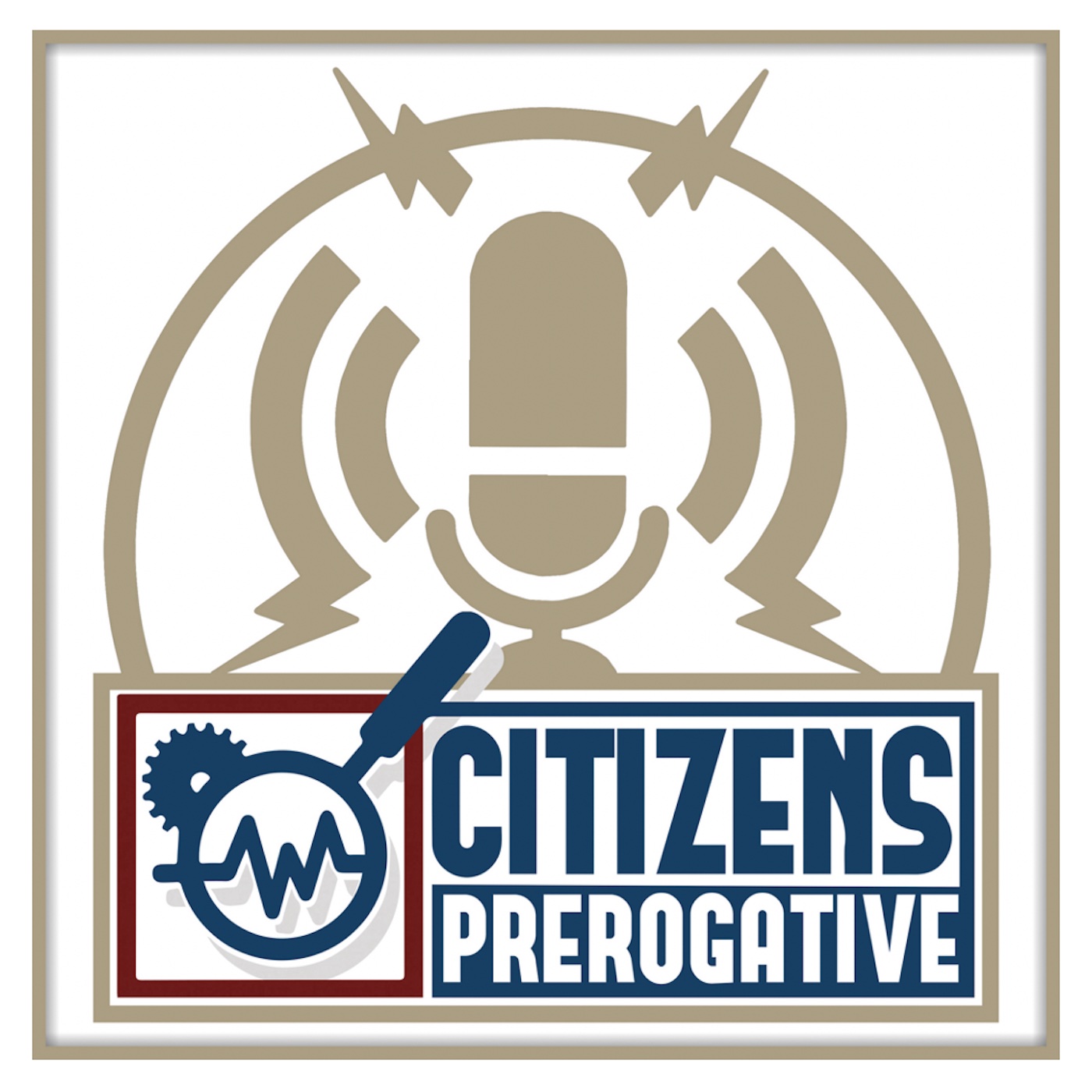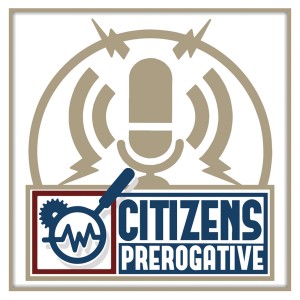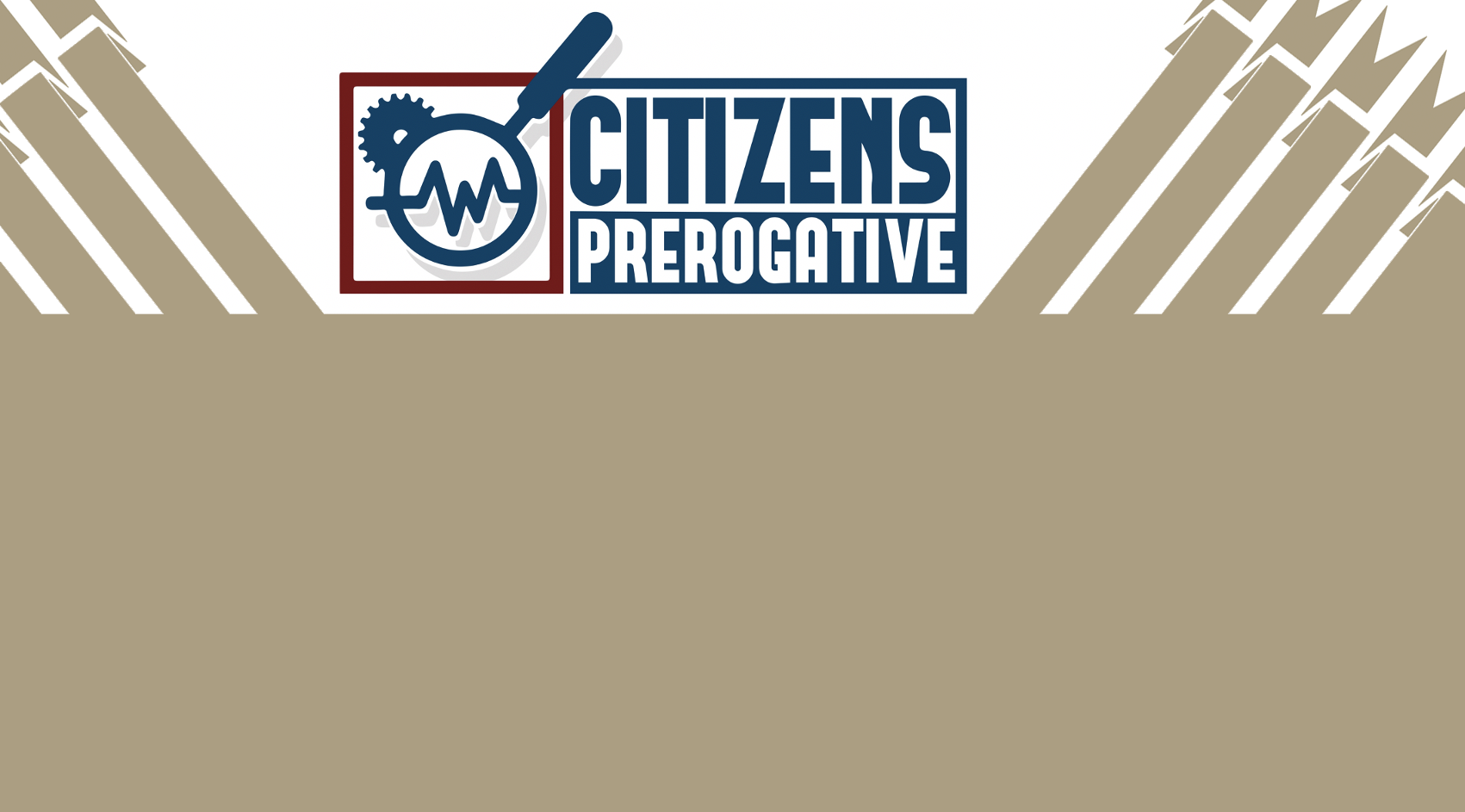
2.4K
Downloads
66
Episodes
In times like these, being a citizen of the United States is a big job. Thank you for joining us to celebrate the virtues of self-rule and debate the state of our republic. Welcome to the Citizens Prerogative Podcast.
In times like these, being a citizen of the United States is a big job. Thank you for joining us to celebrate the virtues of self-rule and debate the state of our republic. Welcome to the Citizens Prerogative Podcast.
Episodes

Tuesday Jun 08, 2021
S2 E27 The State of Voting and Representation
Tuesday Jun 08, 2021
Tuesday Jun 08, 2021
Episode discussion topics
- Our right to vote is under siege by proposals across 43 out of 50 states in the Union (Washington Post, March 11, 2021). This is one of the rare cases DC is fortunate not to have a statehouse. We provide a May round-up on what's passed, below under the more info section.
- First, we review a "brief" timeline on the Hokey Pokey dance for who could vote when and where within the United States. Thank you to Wikipedia for the info. (Full list here, accessed Jun 4, 2021).
1789
- The Constitution of the United States grants the states the power to set voting requirements. Generally, states limited this right to property-owning or tax-paying white males (about 6% of the population).[1] However, some states allowed also Black males to vote, and New Jersey also included unmarried and widowed women, regardless of color. Since married women were not allowed to own property, they could not meet the property qualifications.[2]
1791
- Vermont is admitted as a new state, giving the vote to men regardless of color or property ownership.[5]
1807
- Voting rights are taken away from free black males and from all women in New Jersey.[2]
1870
- The Fifteenth Amendment to the United States Constitution prevents states from denying the right to vote on grounds of "race, color, or previous condition of servitude".
- Disfranchisement after Reconstruction era began soon after. Former Confederate states passed Jim Crow laws and amendments to effectively disfranchise African-American and poor white voters through poll taxes, literacy tests, grandfather clauses and other restrictions, applied in a discriminatory manner. During this period, the Supreme Court generally upheld state efforts to discriminate against racial minorities; only later in the 20th century were these laws ruled unconstitutional. Black males in the Northern states could vote, but the majority of African Americans lived in the South.[17][18]
- Women in Utah get the right to vote.[21]
1882
- Chinese-Americans lose the right to vote and become citizens through the Chinese Exclusion Act.[11]
1883
- Women in Washington Territory earn the right to vote.[24]
1887
- Citizenship is granted to Native Americans who are willing to disassociate themselves from their tribe by the Dawes Act, making those males technically eligible to vote.
- Women in Washington lose the right to vote.[24]
- Women in Utah lose the right to vote under the Edmunds–Tucker Act.[25]
- Kansas women earn the right to vote in municipal elections.[20]
- Arizona, Montana, New Jersey, North Dakota, and South Dakota grant partial suffrage to women.[13]
1913
- Direct election of Senators, established by the Seventeenth Amendment to the United States Constitution, gave voters rather than state legislatures the right to elect senators.[31]
- White and African American women in the Territory of Alaska earn the right to vote.[32]
- Women in Illinois earn the right to vote in presidential elections.[25]
1914
1917
- Women in Arkansas earn the right to vote in primary elections.[20]
- Women in Rhode Island earn the right to vote in presidential elections.[25]
- Women in New York, Oklahoma, and South Dakota earn equal suffrage through their state constitutions.[25]
1918
- Women in Texas earn the right to vote in primary elections.[33]
1920
- Women are guaranteed the right to vote by the Nineteenth Amendment to the United States Constitution. In practice, the same restrictions that hindered the ability of non-white men to vote now also applied to non-white women.
1924
- All Native Americans are granted citizenship and the right to vote through the Indian Citizenship Act, regardless of tribal affiliation. By this point, approximately two thirds of Native Americans were already citizens.[35][36] Notwithstanding, some western states continued to bar Native Americans from voting until 1948.[37]
1943
- Chinese immigrants are given the right to citizenship and the right to vote by the Magnuson Act.[39]
1948
- Arizona and New Mexico are among the last states to extend full voting rights to Native Americans, which had been opposed by some western states in contravention of the Indian Citizenship Act of 1924.[37][40]
1961
- Residents of Washington, D.C. are granted the right to vote in U.S. Presidential Elections by the Twenty-third Amendment to the United States Constitution.[11]
1962-1964
- A historic turning point arrived after the U.S. Supreme Court under Chief Justice Earl Warren made a series of landmark decisions which helped establish the nationwide "one man, one vote" electoral system in the United States.
- In March 1962, the Warren Court ruled in Baker v. Carr (1962) that redistricting qualifies as a justiciable question, thus enabling federal courts to hear redistricting cases.[45]
- In February 1964, the Warren Court ruled in Wesberry v. Sanders (1964) that districts in the United States House of Representatives must be approximately equal in population.[46]
- In June 1964, the Warren Court ruled in Reynolds v. Sims (1964) that each chamber of a bicameral state legislature must have electoral districts roughly equal in population.[47][48][49]
1964
- Poll Tax payment prohibited from being used as a condition for voting in federal elections by the Twenty-fourth Amendment to the United States Constitution.[30]
1965
- Protection of voter registration and voting for racial minorities, later applied to language minorities, is established by the Voting Rights Act of 1965.[11] This has also been applied to correcting discriminatory election systems and districting.
- In Harman v. Forssenius the Supreme Court ruled that poll taxes or "equivalent or milder substitutes" cannot be imposed on voters.[30]
1966
- Tax payment and wealth requirements for voting in state elections are prohibited by the Supreme Court in Harper v. Virginia Board of Elections.[23]
1970
- Alaska ends the use of literacy tests.[44]
- Native Americans who live on reservations in Colorado are first allowed to vote in the state.[50]
1971
- Adults aged 18 through 21 are granted the right to vote by the Twenty-sixth Amendment to the United States Constitution. This was enacted in response to Vietnam War protests, which argued that soldiers who were old enough to fight for their country should be granted the right to vote.[31][51][52]
1973
- Washington, D.C. local elections, such as Mayor and Councilmen, restored after a 100-year gap in Georgetown, and a 190-year gap in the wider city, ending Congress's policy of local election disfranchisement started in 1801 in this former portion of Maryland—see: D.C. Home rule.
1986
- United States Military and Uniformed Services, Merchant Marine, other citizens overseas, living on bases in the United States, abroad, or aboard ship are granted the right to vote by the Uniformed and Overseas Citizens Absentee Voting Act.[59]
2013
-
- Supreme Court ruled in the 5–4 Shelby County v. Holder decision that Section 4(b) of the Voting Rights Act is unconstitutional. Section 4(b) stated that if states or local governments want to change their voting laws, they must appeal to the Attorney General.[62]
- Call to Action: Email or call your Congressional Senator to voice your support for HR1 - For the People Act of 2021 which passed the House and sits on the doorstep of the Senate. Now is a critical time. Also, it's worth mentioning that a more focused bill, the John Lewis Voting Rights Advancement Act seems to have enough support to pass the Senate, as of this moment anyway.
- Find out what it takes to vote in your county and get it taken care of, then vote in candidates who support everyone's access and right to vote.
Your hosts: Michael V. Piscitelli and Raymond Wong Jr.
More info
- According to Voting Laws Roundup: May 2021 by the Brennan Center for Justice, states have already enacted more than 20 laws this year that will make it harder for Americans to vote — and many legislatures are still in session. Between January 1 and May 14, 2021, at least 14 states enacted 22 new laws that restrict access to the vote. At least 61 bills with restrictive provisions are moving through 18 state legislatures.
- Just to illustrate the variety of voting conditions available to citizens across the thousands of counties among the 50 states, here's a chart. :-)
- Please feel free to share your thoughts through our Contact Us page or on Facebook.
Learn more and reach out
- Head to Citizens Prerogative for additional information and log in or sign up to leave a comment.
- Don't forget to join our free newsletter and get 10% off at our shop! Go the extra mile by supporting us through Patreon.
- Please contact us with any questions or suggestions.
Special thanks
- Our ongoing supporters, thank you!
- Our sponsor CitizenDoGood.com.
- Graphic design by SergeShop.com.
- Intro music sampled from “Okay Class” by Ozzy Jock under creative commons license through freemusicarchive.org.
- Other music provided royalty-free through Fesliyan Studios Inc.
Version: 20241125

No comments yet. Be the first to say something!